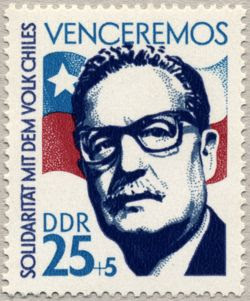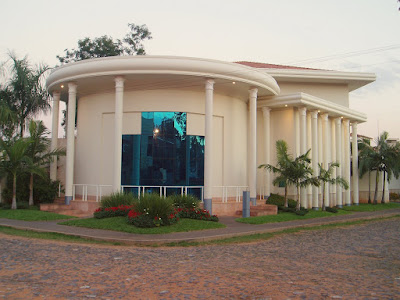 office as priest, and he hopes to return to that profession after his five years as president. Like Morales in Bolivia and Correa in Ecuador, his clothing is of indigenous style, and Lugo wears sandals nearly everywhere. Despite jokes that he has needs a visit the podiatrist for ongos, the sandals are a symbol of his continuing faith. A famous carpenter, one popular with the people, also wore sandals.
office as priest, and he hopes to return to that profession after his five years as president. Like Morales in Bolivia and Correa in Ecuador, his clothing is of indigenous style, and Lugo wears sandals nearly everywhere. Despite jokes that he has needs a visit the podiatrist for ongos, the sandals are a symbol of his continuing faith. A famous carpenter, one popular with the people, also wore sandals.Liberation theology has been suggested as the defining philosophy for his presidency, a philosophy that argues that as part of the religious life one should target poverty because the founders of the philosophy believed it was the source of sin. Hence, eradicating sin means eradicating poverty, and vice versa. In liberation theology, the mission of religious life is to redeem the poorest of the earth, particularly through political activism. Because political and economic institutions subject certain groups of humans in poverty, liberation theologists focus on changing them in their pursuit of both equality and a world without sin. Perhaps Lugo didn’t renounce completely his office in the church, but has taken up one where he can be more effective.
Lugo has said that one of his role models is Salvador Allende, the president of Chile from 1970-1973. Overthrown in a coup led by various factions in the government and succeeded by Augusto Pinochet, Allende
 was the first Marxist leader to gain power through a democratic election. A candidate who appealed to the workers of Chile, he took land from those who owned it, nationalized many primary industries in the country, and created social programs aimed to eradicate poverty. Much like Roosevelt in the Great Depression, who has also been mentioned with reference to Lugo’s task, Allende created employment through public works programs and nationalization. But, facing arguably more obstacles than faced by the Roosevelt, Allende’s reforms were not effective and in a short time the country was ravaged by inflation and the appearance of black markets for basic commodities. Allende’s friendship with Fidel Castro amplified American worries of communism taking root in Chile. In the end Allende’s socialist state did not survive. Allende, at the height of a coup d’état, made his final radio speech to the people and allegedly killed himself with a rifle given to him
was the first Marxist leader to gain power through a democratic election. A candidate who appealed to the workers of Chile, he took land from those who owned it, nationalized many primary industries in the country, and created social programs aimed to eradicate poverty. Much like Roosevelt in the Great Depression, who has also been mentioned with reference to Lugo’s task, Allende created employment through public works programs and nationalization. But, facing arguably more obstacles than faced by the Roosevelt, Allende’s reforms were not effective and in a short time the country was ravaged by inflation and the appearance of black markets for basic commodities. Allende’s friendship with Fidel Castro amplified American worries of communism taking root in Chile. In the end Allende’s socialist state did not survive. Allende, at the height of a coup d’état, made his final radio speech to the people and allegedly killed himself with a rifle given to him  by Fidel. On the rifle was the inscription: “To my good friend Salvador from Fidel, who by different means tries to achieve the same goals.” With any luck Lugo will have more success than Allende did with his reforms, and will avoid being overshadowed or coerced by his friend from Venezuela.
by Fidel. On the rifle was the inscription: “To my good friend Salvador from Fidel, who by different means tries to achieve the same goals.” With any luck Lugo will have more success than Allende did with his reforms, and will avoid being overshadowed or coerced by his friend from Venezuela.What is sure, though, is that this weekend Lugo assumed a role in the socialist tradition of Latin America. He began his speech in Guaraní, but after a few minutes asked permission to switch from Guaraní to Spanish so that the visitors might understand too. Guaraní speakers took special note of the respectful, though political, gesture. He didn’t mention el dios in his speech, and there does seem to be at this point a good separation of church and state in Paraguay, but he did talk about the people. And while Lugo is now President, it is his promise to stay with them. Other leaders in Latin America are leading with the same cause, and trying to work through the government to bring power to the people. In a very special was he hopes to use the office: Lugo realizes that revolution in Paraguay will not come from elections alone, but must be with the culture of the people. As Lugo remarked of the challenge to the people, “it could be the most important wager in Paraguay’s history.”












